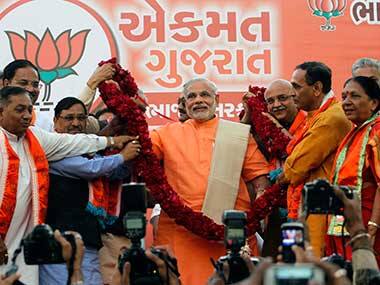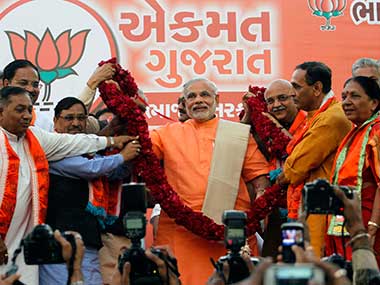Four simple words, Pehle Shauchalaya, Phir Devalaya (toilets first, temples later), have distanced Narendra Modi from the extremist Hindutva elements. In a single stroke, he has distinguished himself from the Pravin Togadias, telling the more progressive sections of Hindus that he cares more for governance and sanitation over mindless ritualism. The message was meant equally for the those of other faiths, most notably the Muslims, that he should not be seen as only a Hindu Hriday Samrat. Just as Rural Development Minister Jairam Ramesh was right when he spoke on similar lines on the same subject in October last year, Modi was right when he spoke on the subject at a youth convention in Delhi on Mahatma Gandhi’s 144 birth anniversary. Jairam, always articulate, perhaps erred in his choice of words: Mandir se bhi jyada pavitra…(toilets more sacred than temples). But then Jairam does not have the flourish of oratory that Modi has, nor the kind of complete control over his party that the BJP’s Prime Ministerial candidate enjoys. The Congress had pretty much left Jairam to defend his stand himself. The BJP was wrong in protesting then, picking one phrase instead of the essence of Jairam’s argument. And the Congress is wrong today for the same reason. The suggestion that Modi’s remarks are linked to Ayodhya are facetious, or designed to arouse a Hindu backlash against Modi and the BJP. [caption id=“attachment_115193” align=“alignleft” width=“380”]
 He wants to be seen as more than a Hindu leader. AP[/caption] The Congress is not sure of how to deal with the cause that Modi is now championing. It is trying to play a soft Hindutva, a trap the Congress has fallen into earlier and one it never got dividends for. Modi has succeeded in an image makeover, at least partially, whether or not his critics like to believe that. An astute politician who won Gujarat elections three time knows that his prime ministerial nomination would only be worthwhile if carves out a social constituency outside hard core Hindutva, find supporters among common masses who are not particularly driven by any misguided religious beliefs, the aspirational youth, women in rural and semi urban areas who suffer the shame of not having toilets. The issue is caste, and religion neutral, even if it may not be class neutral. The kind of vitriolic retaliation that he got from his fellow Sangh traveler, Pravin Togadia, with whom he shares a hate-hate relationship, has only served his purpose of reaching out to the wider masses. Following the Sri Ram Sene’s obscurantist and obstructionist protests against Valentine’s day in parts of Karnataka, there was a joke doing the rounds that if Modi comes to power, then Raksha Bandhan would be celebrated on Saint Valentine’s Day, February 14. Modi may not comment on that, but he has impressed upon observers that he in no way to be identified with fringe groups who flaunt the colour saffron for their purposes. In a statement Togadia said, “we are stunned and shocked to hear about the unnecessary mention of temples by Narendra Modi in a statement wherein he was talking about the need for better sanitation facilities in the country. We too believe in the need for better hygiene. But the way temples were dragged in the matter was uncalled for. It is nothing short of an insult to the Hindu society.” Togadia has lost his relevance in the Sangh Parivar. Even in the VHP, he is designated as International Working President and mostly plays as a factional leader. From his Gujarat experience Modi knows that banishment of the Togadias and their hate speeches against Modi actually helped him garner greater support among the Hindu community and also neutralize the hostility of a substantive section of Muslims. The kind of shrill responses that he got from the Congress, Digvijay Singh, Jairam Ramesh, Rajiv Shukla, Jagdambika Pal and others is indicative of the fact that the party was taken off guard – the supposed Hindu Hriday Samrat was talking like a heretic and raking up a “secular” issue. Incidentally, the same event was also the occasion for Modi to respond to Prime Minister Manmohan Singh’s unusual usage of words to describe his rise, “an onslaught”. In his onboard Air India One media briefing while returning from the US, a journalist asked the PM “Do you think that the emergence of Mr. Narendra Modi on the national scene is a threat to the secular polity of our country?” Manmohan Singh had replied: “I sincerely hope that all secular forces would combine to face the onslaught of people like Mr. Narendra Modi. And I have every reason to believe that that will happen. You wait for some time before the people realise what they are up against.” In a way Singh statement was a grudging acknowledgement that Modi’s onslaught had become a challenge, an advancement from previous position that the BJP’s prime ministerial candidate was just another chief minister. “The PM should realise that these statements of the 1980s won’t work today,” Modi said. He then chose to define his own brand of secularism. Though he does not have the intellectual refinement of LK Advani who redefined cultural nationalism and called the so called secularists as pseudo-secularists during the 90s, Modi has opted for a simpler, earthly definition, India first. “For some, secularism is just a weapon to deceive the public. But people have recognised those who deceive them,” he added. Modi has been constantly changing course of public discourse and making customized statements to suit the audience he is interacting with. The Congress and his critics are finding it difficult to catch up with that pace.
He wants to be seen as more than a Hindu leader. AP[/caption] The Congress is not sure of how to deal with the cause that Modi is now championing. It is trying to play a soft Hindutva, a trap the Congress has fallen into earlier and one it never got dividends for. Modi has succeeded in an image makeover, at least partially, whether or not his critics like to believe that. An astute politician who won Gujarat elections three time knows that his prime ministerial nomination would only be worthwhile if carves out a social constituency outside hard core Hindutva, find supporters among common masses who are not particularly driven by any misguided religious beliefs, the aspirational youth, women in rural and semi urban areas who suffer the shame of not having toilets. The issue is caste, and religion neutral, even if it may not be class neutral. The kind of vitriolic retaliation that he got from his fellow Sangh traveler, Pravin Togadia, with whom he shares a hate-hate relationship, has only served his purpose of reaching out to the wider masses. Following the Sri Ram Sene’s obscurantist and obstructionist protests against Valentine’s day in parts of Karnataka, there was a joke doing the rounds that if Modi comes to power, then Raksha Bandhan would be celebrated on Saint Valentine’s Day, February 14. Modi may not comment on that, but he has impressed upon observers that he in no way to be identified with fringe groups who flaunt the colour saffron for their purposes. In a statement Togadia said, “we are stunned and shocked to hear about the unnecessary mention of temples by Narendra Modi in a statement wherein he was talking about the need for better sanitation facilities in the country. We too believe in the need for better hygiene. But the way temples were dragged in the matter was uncalled for. It is nothing short of an insult to the Hindu society.” Togadia has lost his relevance in the Sangh Parivar. Even in the VHP, he is designated as International Working President and mostly plays as a factional leader. From his Gujarat experience Modi knows that banishment of the Togadias and their hate speeches against Modi actually helped him garner greater support among the Hindu community and also neutralize the hostility of a substantive section of Muslims. The kind of shrill responses that he got from the Congress, Digvijay Singh, Jairam Ramesh, Rajiv Shukla, Jagdambika Pal and others is indicative of the fact that the party was taken off guard – the supposed Hindu Hriday Samrat was talking like a heretic and raking up a “secular” issue. Incidentally, the same event was also the occasion for Modi to respond to Prime Minister Manmohan Singh’s unusual usage of words to describe his rise, “an onslaught”. In his onboard Air India One media briefing while returning from the US, a journalist asked the PM “Do you think that the emergence of Mr. Narendra Modi on the national scene is a threat to the secular polity of our country?” Manmohan Singh had replied: “I sincerely hope that all secular forces would combine to face the onslaught of people like Mr. Narendra Modi. And I have every reason to believe that that will happen. You wait for some time before the people realise what they are up against.” In a way Singh statement was a grudging acknowledgement that Modi’s onslaught had become a challenge, an advancement from previous position that the BJP’s prime ministerial candidate was just another chief minister. “The PM should realise that these statements of the 1980s won’t work today,” Modi said. He then chose to define his own brand of secularism. Though he does not have the intellectual refinement of LK Advani who redefined cultural nationalism and called the so called secularists as pseudo-secularists during the 90s, Modi has opted for a simpler, earthly definition, India first. “For some, secularism is just a weapon to deceive the public. But people have recognised those who deceive them,” he added. Modi has been constantly changing course of public discourse and making customized statements to suit the audience he is interacting with. The Congress and his critics are finding it difficult to catch up with that pace.
Modi's toilet comment will win against both secularists, communalists
Sanjay Singh
• October 4, 2013, 11:13:35 IST
He knows his PM aspirations need support outside hardcore Hindutva, including among aspirational youth, women who suffer the shame of not having toilets.
Advertisement
)
End of Article